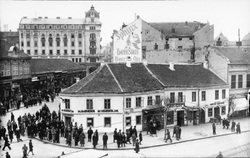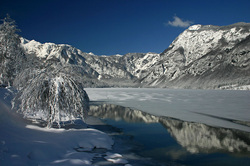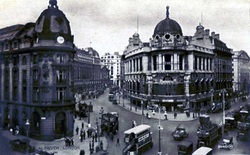Belgrade (1930s)

In 1929 Stephen Graham visited Yugoslavia planning to write a novel about the terrorists who had assassinated Archduke Franz Ferdinand in Jne 1914. He took introductions from Dmitrije Mitrionovic who had been on the fringes of the group which carried out the murder. The novel Stephen wrote - St Vitus Day - described the conspiracy leading up to the assassination in almost documentary fashion. It is clear that he had obtained information from Mtrinovic and others on the fringes of the conspiracy. The book was well-reviewed in Britain and translated into Serbo-Croat - winning Stephen many friends in Yugoslavia.
Stephen spent much of the 1930s in Yugoslavia, renting a house in the Julian Alps, close to the Austrian border. The appeal was two-fold. Stephen's finances suffered in the wake of the Wall Street crash - and life in provincial Yugoslavia was comparatively cheap. In the second place, he had met and fallen in love with Dmitrije's sister Vera. The two of them travelled extensively through Yugoslavia (Stephen was later to write of their experiences in his book The Moving Tent). He also published a novel, Balkan Monastery, describing Vera's experiences as a young girl in the First World War when she was sent to an orphanage where she faced harsh treatment. Stephen was by the mid 1930s a well-known figure in Yugoslavia, and he was able to interview members of the Royal Family and senior ministers in order to write his book Alexander of Yugoslavia, which described the murder of the Yugoslavian king by terrorists on a trip to Marseilles in 1934. Yugoslavia never entirely replaced Russia in Stephen's heart and head. It did nevertheless win an important place in his heart - along with Vera - and he travelled extensively to the country until just a few years before his death.
Stephen spent much of the 1930s in Yugoslavia, renting a house in the Julian Alps, close to the Austrian border. The appeal was two-fold. Stephen's finances suffered in the wake of the Wall Street crash - and life in provincial Yugoslavia was comparatively cheap. In the second place, he had met and fallen in love with Dmitrije's sister Vera. The two of them travelled extensively through Yugoslavia (Stephen was later to write of their experiences in his book The Moving Tent). He also published a novel, Balkan Monastery, describing Vera's experiences as a young girl in the First World War when she was sent to an orphanage where she faced harsh treatment. Stephen was by the mid 1930s a well-known figure in Yugoslavia, and he was able to interview members of the Royal Family and senior ministers in order to write his book Alexander of Yugoslavia, which described the murder of the Yugoslavian king by terrorists on a trip to Marseilles in 1934. Yugoslavia never entirely replaced Russia in Stephen's heart and head. It did nevertheless win an important place in his heart - along with Vera - and he travelled extensively to the country until just a few years before his death.
Lake Bohinj

Stephen had penned a number of novels in the 1920s which met with varying degrees of success, but by the 1930s he devoted far more effort to writing fiction, largely because of the income it provided. He wrote seven novels during the 1930s, ranging from historical pieces like St VItus Day through to comedies like The Padre of St Jacobs (several were written in a cottage he rented on the shore of Lake Bohinj in northern Yugoslavia - left). A number of his novels like Lost Battle and One of the Ten Thousand dealt with the theme of falsehood and truth. Graham was fascinated by the way in which people - particularly in modern cities - could construct a false identity for themselves. He was only too aware of the way that his father had done this in real life after leaving his first family (Graham wrote about his father in fictional form in Lost Battle). In his personal crisis of the 1920s - which had led to the break-up of his marriage - he was also intensely aware of the way in which his own personality was splintered into many parts. The appearance of one of Stephen's novels - African Tragedy - got him into considerable trouble. Stephen and Vera visited southern Africa in 1936, where they stayed at the home of the author Neal Harman. Harman was also on occasion joined by Margot Layton (Lady Chesham) who owned land near by. In African Tragedy - in which the main protagonists were clearly modelled on Harman and Chesham - Stephen depicted them in a rather unpleasant light. The two of them sued Stephen's publishers and won. Stephen himself had wisely retreated to Yugoslavia to avoid the case.
London Life

Stephen had to spend a certain amount of time in London in the 1930s. This was partly because he needed the resources of the British Library to write a series of biographies on Russia Tsars such as Boris Godunov, Peter the Great and Alexander II. He also wrote a biography of Stalin - which appeared in the early 1930s - which was perhaps surprisingly undjudgemental (the worst days of the GULAG were still ahead). Stephen also still felt a strong emotional commitment to London - which explains why he gradually tried to acquire the lease for all the flats in 60 Frith Street - a place which had a great emotional resonance for him. In his collection Twice Round the London Clock he recalled how he had in his travels 'remembered Frith Street under Central Asian and Rocky Mountain stars, in the trenches and on the sea. I have looked to it as toward Mecca’.